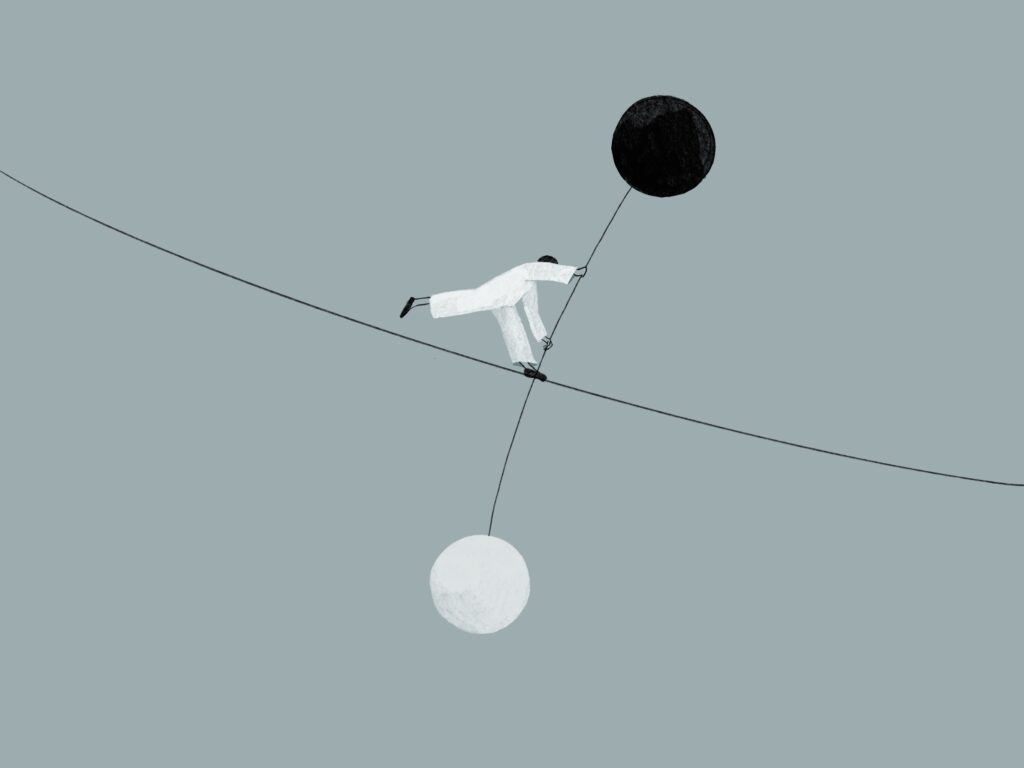
“Binary paths belong in bygone past, all things civilized are non-binary.”
― Abhijit Naskar
If thinking precedes action, it’s never more vital to examine how we think than in times of crisis, division, and fear. Despite the lessons of the past and our ever expanding access to information, we seem unable to move beyond binary ways of thinking.
Binary thinking is essentially a way to organise the world into ‘good/bad,’ ‘true/false’, ‘is/is not,’ or ‘with us/against us.’ Crucially, according to Jacques Derrida, our binary thinking, particularly in the West, is defined in terms of opposition, where ‘one governs the other,’ or is superior to the other, e.g. man/woman, mind/body. This kind of thinking, he argued, was arbitrary and needed to be deconstructed.
A consequence of binary thinking is that it leads us to look for things that reinforce what we already believe is true and will become increasingly dismissive of anyone who disagrees with us (with the helpful guidance of social networks). Slowly, we lose our capacity for nuance and ‘grey area’ thinking.
This is a dangerous place to be in, Pema Chödrön warns, because what happens when people don’t agree with us, do we find ourselves getting angry and aggressive? “If we look into the very moment of anger or aggression, we might see that this is what wars are made of,” she writes.
We can see today increased polarisation, fragmentation and isolation in our societies, at the interpersonal and global level. The result, Otto Sharmer argues, is that our societies are no longer able “to hold spaces for making sense of complex social issues and analyse them from different perspectives.”
This creates blindspots, he says, and has resulted in the West’s inability to see its role and complicity in what we now see unfolding in Ukraine. “If we step back a bit to look at the deeper cognitive structure that is giving rise to this war, what do we see? We see a system that leads us to collectively create results that nobody wants,” he observes.
It also affects how we act, including whether and how we choose to help. As binary thinking tends to overly simplify complex issues, we are more likely to be seduced by simple solutions that rarely address the underlying causes of the problem; but they make us feel and look good.
Furthermore, while solidarity for the victims of war is, of course, a positive and necessary side effect to conflict, we are brought together because of a common enemy. It is a way to express our own rage. Are we not at risk then, of adding more aggression and causing further division?
So what can we do about this? How can we deconstruct our thinking?
Sharmer suggests there are two internal conditions from which we can choose to operate. The first one is what he calls ‘Putinism’ (but also ‘Trumpism’ and other harmful behaviours leading to the destruction of the planet) which he refers to as the closing of the mind, heart and will, which results in ignorance, hate and fear.
The second choice is what he refers to as the opening of the mind, heart and will, which results in curiosity, compassion, and courage.
It’s in this space that humility can be cultivated, where we can begin to let go of our tightly held beliefs and perhaps seek comfort in the grey area. It is in this space that we can seek wise action.
As Chödrön illustrates: “Everything is ambiguous; everything is always shifting and changing, and there are as many different takes on any given situation as there are people involved. Trying to find absolute rights and wrongs is a trick we play on ourselves to feel secure and comfortable.”
Given the distressing times in which we find ourselves, perhaps we should seek wisdom in the most unlikely of places: a kindergarten. We end this post by sharing some wise words for fixing the world by four-year old Brayden (you read that correctly!) which has been animated by Ukrainian artist Stas Santimov.
BULLETS
by Brayden
Sit down, world
and relax
so you don’t have tornadoes.
Trees, color your leaves.
Relax, people. Go to sleep.
Relax, wolves. Lay down by the trees.
Relax, bullets from guns.
Stop shooting people.
Fire, eat wood.
For references and further resources, visit our inspiration page. See also A Compassion Revolution, In Pursuance of Curiosity, and Creative and Destructive.
Words, Veronica Yates and illustration, Miriam Sugranyes
